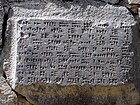Yerevan History Museum
Երևանի Պատմության Թանգարան | |
 The main facade of the museum | |
 | |
| Established | 1931 |
|---|---|
| Location | 1/1 Argishti street, Yerevan, |
| Type | History museum |
| Collection size | History of Yerevan |
| Director | Armineh Sargsyan |
| Website | Official website |
The Yerevan History Museum (Template:Lang-hy (Yerevani Patmut'yan T'angaran)) is the history museum of Yerevan, the capital city of Armenia. The museum was founded in 1931 as the Communal Museum. Currently, the museum It is located in a building attached to the Yerevan City Hall.
The architect of the building was Jim Torosyan.[1]
History
| Years | Place | Duration (years) |
|---|---|---|
| 1931-1936 | Yerevan Fire Department building 2 rooms in 2nd floor |
5 |
| 1936-1994 | Blue Mosque ("Gök Jami") | 58 |
| 1994-1997 | Hripsime Female Gymnasium | 3 |
| 1997-2005 | School №1 after Stepan Shahumyan Mashtots Street 23 |
8 |
| 2005–present | Yerevan City Hall |
At the beginning, the museum was located in two rooms, on the second floor, of the Yerevan Fire Department building. In 1936, it was moved to the Blue Mosque (Gyoy-Djami) where had functioned for sixty years. From 1994 to 1997, the museum was located in the building of former Hripsime Female Gymnasium. From 1997 to 2005, the museum functioned in one of the adjacent buildings of the school N1 named after Shahoumian. In 2005, the museum was established in a new building. It forms an architectural complex together with Yerevan Municipality.
Collection
There are more than 87,000 objects exposed in the Yerevan History Museum. They represent the local material and spiritual culture from ancient times to the present day. The collections of archaeology, ethnography, numismatics, fine arts, written records, photography and others, kept in the storage of the museum, tell a vivid story about the past and the present of the capital city and its people. There are three scientific expositions of the museum, that have collected, studied and showed objects highlighting the history of Yerevan.
Scientific council
The scientific council affiliated to the museum has had the best intellectuals and artists of the time as its members, including:[citation needed]
- Architects
- Painters
- Sculptors
- Scientists
The museum today
The museum is a leisure place for people of all ages, occupation and preferences. Presently the public relations experience of the museum has gained new application. The museum-school ties are being strengthened acquiring new meaning and importance. The museum is in continual contact with old citizens as well as citizens of young generation. The mass media always highlights the everyday life of the museum and the events dedicated to the city. Each year the publications of the personnel increase in number.
Exhibition halls
The inauguration of the main exposition of the museum took place on 3 April 2007 during which the President of the Republic of Armenia Robert Kocharian, Yerevan Mayor Yervand Zakharian, and other high officials were present.[citation needed]
The main exposition of the museum consists of three parts.[citation needed]
See also
- List of museums in Armenia
- History Museum of Armenia
- Yerevan
- Erebuni Fortress
- National Gallery of Armenia
- List of Armenian Genocide memorials
- Charents Museum of Literature and Arts
- Aram Khachaturian House-Museum
- Matenadaran
References
Bibliography
- Albert Parsadanyan. School Companion. Yerevan, VMV-Print, 2008, pp. 102–103.

